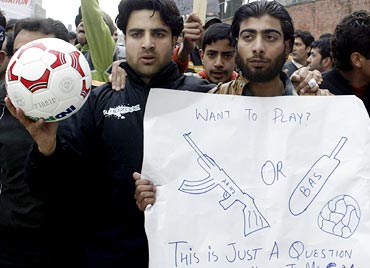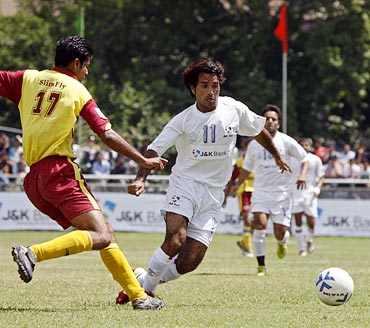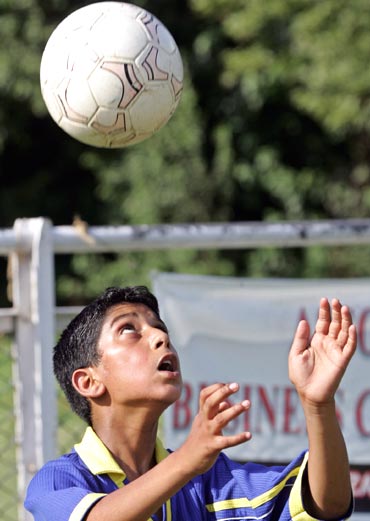The beautiful game is defying all odds as, despite the continuing trouble in the state, it has been turning into an all consuming passion for the youth of both sexes given that some have established themselves at the national stage.
Jammu and Kashmir Football Association (JKFA), formed in 1964, claims to have witnessed a dramatic increase in the number of youngsters interested in the sport in the last 10 years, with a sudden jump in the number of football teams from all the districts of the state.
"The sport, which is rightly called the traditional sport of the state, is coming back on track. In 10 years, there has been a tremendous rise in the number of people interested in the sport. When we came into existence, we had just four clubs in the entire state. Now it is around 500. Young people, both men and women from all around the state are playing not just as amateurs but professionals for the state, nationals and internationals," JKFA general secretary, S A Hameed said.
Photographs: Reuters
Kashmir's Ahmad named Bagan captain
Image: Ishfaq Ahmad (right) of Jammu and Kashmir tries to get the ball past Himachal's Ramesh KumarThe oldest football club of the country, Mohun Bagan has named Ishfaq Ahmad from the state as its captain for the coming season, making him the first footballer from Jammu and Kashmir to be named skipper of any national-level club.
"I'm happy to have become the captain of Mohun Bagan. I will work hard. It is an honour to lead the oldest club of the country. It gives me internal satisfaction to see myself now among the finest footballers of the country and world who have been associated with the club," he said.
'I come and play because it energises me'
Image: A young boy trains at the polo ground in Srinagar14-year-old Zuhaib, dressed in a red jersey and navy blue trousers, says that playing football is the only thing that makes him alive in the otherwise dead world he lives in.
"I come and play because it energises me. I feel alive. It is an easy escape from the regular tense world we live in. It is fun," he said, as he curled the ball into the net in the city's Pologround.
In normal days, not hit by any strike or demonstration, the playing fields in Pologround, Eidgah, Natipora, Islamic College and Bakhshi Stadium are stuffed with spectators and players, ranging from teenagers to old people.
Taxis and auto-rickshaws are lined up, as supporters of the teams throng the grounds to cheer the players. Shouting slogans and fluttering banners, the football grounds seem to be the liveliest places here.
Mehraj-u-din Wadoo, who has established as an India international for some time now, said football has always been the most popular sport among the youth in Kashmir and being low budget, it fits into the lives of people in the state.
"It is an extremely inexpensive sport. You just need a ball and shoes and you are done, unlike cricket where the kit is extremely expensive," Wadoo said.
Wadoo, who is a part of the national team training in Portugal now for the 2011 Asian Cup in Qatar, has launched an Academy, for under-16 football players in the valley.
'I discovered a very strong football culture in the valley'
Image: Young Kashmiri boys during a training camp in SrinagarBrazilian coach Juan Marcos says that Kashmiri youths have enormous talent not seen in youths of other states.
"They have a strong football culture," he said.
Marcos, who shifted to Kashmir with his family to train football lovers in 2007, established International Sports Academy Trust (ISAT), for "integral youth preparation."
"I came to India in 1998 and worked in Delhi but couldn't get the desired response from children there. Just when I was thinking of shifting to some other place, I discovered a very strong football culture in the valley. Youths here have passion, enthusiasm and desire to be professionals," Marcos said.
"It is strange that old people come up to us complaining about not organising a football match here for more than a week. It seems it is a never dying craze here," an official from the JKFA said.
Football was introduced in Kashmir in 1890
Image: Youngsters hone their skills during a training camp in SrinagarRemembering the early 1980's, Kashmir's first international footballer, now a selector for Jammu and Kashmir Football Association, Shafi Nari said, "There was a huge crowd of around 80,000 to 90,000 fans cheering for the players. There was a craze for football in Kashmir always. It was a kind of obsession ... a deep passion.
"In Srinagar, as a part of the Super league, we have 14 teams. In A-division there are 14 teams and in B-division, there are 70 teams. Besides, there are 50 teams in Sopore, 25 in Baramulla, 28 in Anantnag, 24 in Budgam, eight in Pulwama, 34 in Bandipore, 12 in Ganderbal, six in newly formed district Kulgam and 12 in Kupwara," JKFA treasurer, Fayaz Ahmad Sofi said.
The Valley has produced several top football players for the country. One of them, Abdul Majeed Kakroo, represented India from 1981 to 1989. Mohammad Yousuf Dar wore the national colours in 1977-78 and became the first senior footballer of the state to represent the country.
Football was introduced in Kashmir in 1890 by a British missionary, Canon C E Tyndale Biscoe who was also the founder of Srinagar's historic Biscoe School.
When he first placed a football in front of the school children, they were surprised to see what it was.
A British football team was later set up in Kashmir by Young Hardow, proprietor of the Hardow Carpet Factory.





Comment
article